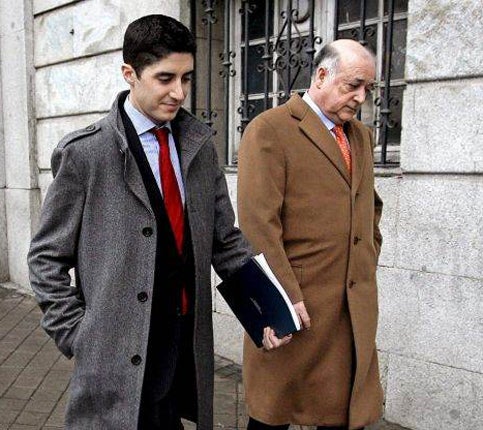Cycling: Alberto Contador's lawyer explains ban U-turn

Alberto Contador's lawyer has told The Independent how his client's suspension has been lifted despite him being found with the banned substance clenbuterol in his system when he won last year's Tour de France after eating contaminated steak.
Andy Ramos said the defence team's default position in the case was that Contador had strayed across the boundaries of anti-doping law without being aware he was doing so. "The [anti-doping] legislation states that a rider is responsible for any banned substance in his body," Ramos says. "But there's a clause that frees him of that responsibility if he can demonstrate there was no intentional negligence. We proved that, and that was the key to his defence. From day one his defence was based around that clause."
The other confusion surrounding Contador's proposed ban was the length, which was just a year, but Ramos explains this "was no more than a prosecutor's proposal". "It was wrongly thought that a year's ban was an actual sentence, and that the Spanish cycling federation was then influenced by political pressure in Spain [to reduce it]. But that proposal was not legally binding."
As for those who believe that a banned substance in an athlete's body is a positive under Wada regulations come what may, Ramos argued "they should read the whole rulebook, not just the article [that states that] and they would find there are exceptions to that rule."
"That exception was applied by the Spanish federation in Alberto's case, by CAS in the case of [tennis player Richard] Gasquet, and by the German Federation in the [table-tennis player Dimitrij] Ovtcharov case."
Much of the collective bafflement and cynicism north of the Pyrenees that greeted the Contador verdict has arguably been provoked by the confusion over the exact nature of Contador's defence, given he had literally consumed the prime piece of evidence in his favour, namely the beef.
But Ramos says there was plenty of indirect evidence that helped to clear Contador. "We showed that the testing for clenbuterol in cattle is not infallible in Europe," he says. "There is a European Union norm – 96/23/CE, dating from 1996 – which states that only 0.25 per cent of cattle should be tested for clenbuterol. So 99.75 per cent are not.
"During the very same period the Spanish Ministry of Agriculture says that there have been no positives for clenbuterol in [Spanish] cattle. But we've shown that the police have gone on arresting people for using clenbuterol and other banned substances in their livestock." As for the offending cow itself, "The Basque Government gave us three possibilities, and curiously enough, the owner of the one that was most likely to be it is in partnership with his brother, who was penalised a few years back for using clenbuterol.
"So when WADA [the World Anti-Doping Authority] says it is impossible that the banned substance clenbuterol could be found in Spanish cattle, that's like saying, ‘Cocaine is banned, end of story'."
Ramos is adamant that any comparison with Spanish athlete Josephine Onyia, who was banned for two years after claiming she ate clenbuterol-infected meat, is invalid. "Onyia tested positive for two substances, not just clenbuterol, because she also tested positive for methylhexaneamine. And CAS [the Court of Arbitration for Sport] said they could not determine the exact quantity in her system [on a particular day]... so there was no way of knowing if it affected her performance.
"With Alberto there was a maximum quantity of clenbuterol" – 40 times less than the minimum required for an anti-doping lab to detect – " on a specific day and it dropped afterwards."
In Europe it's not impossible [to eat contaminated meat], merely improbable. And TAS themselves say that there is no way you can oblige athletes to go to unrealistic extremes, such as analysing everything they eat in a mobile lab or keeping a lump of every piece of meat they eat."
Contador's case could well establish new anti-doping jurisprudence, too, meaning that the onus may now shift back onto the authorities to establish athletes' guilt, rather than athletes having to demonstrate - as is currently the case - that they are wrongly accused of cheating. Time will tell on that one, but Ramos already has his own conviction of the verdict's importance, that "the system should not penalize the innocent."
"The World Anti-Doping legislation is designed to guarantee fairplay, but that doesn't mean you can suspend innocent people. The moment that happens, the rules have to change."
Join our commenting forum
Join thought-provoking conversations, follow other Independent readers and see their replies
Comments
Bookmark popover
Removed from bookmarks